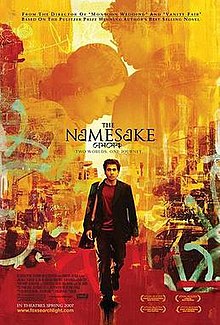|
The Namesake (film)
The Namesake is a 2006 English-language drama film directed by Mira Nair and written by Sooni Taraporevala based on the novel The Namesake by Jhumpa Lahiri. It stars Kal Penn, Tabu, Irrfan Khan and Sahira Nair. The film was produced by Indian, American and Japanese studios.[3] The film was released in the United States on 9 March 2007, following screenings at film festivals in Toronto and New York City. The Namesake received positive reviews from American critics.[4] PlotThe Namesake depicts the struggles of Ashoke and Ashima Ganguli, first-generation immigrants from the state of West Bengal to the United States, and their American-born children Gogol and Sonia. The film takes place primarily in Kolkata, New York City, and suburbs of New York City. The story begins as Ashoke and Ashima leave Kolkata and settle in New York City. Through a series of miscues, their son's nickname, Gogol (named after Russian author Nikolai Gogol), becomes his official birth name, an event which will shape many aspects of his life. The story chronicles Gogol's cross-cultural experiences[5] and his exploration of his Bengali heritage, as the story primarily shifts between the United States and Kolkata. Gogol becomes a lazy, cannabis-smoking teenager who is indifferent to his cultural background. He resents many of the customs and traditions his family upholds and doesn't understand his parents. After an eight month long trip to India before starting college at Yale, Gogol starts opening up to his culture and becomes more accepting of it. Shortly after his eighteenth birthday, much to his parents' annoyance, Gogol legally changes his name to "Nikhil", (the name he had supposedly refused to be addressed by when he was in kindergarten). In college, Gogol uses his "good name" Nikhil (later shortened to Nick). He works as an architect and dates Maxine, a white American woman from a wealthy background, who is clueless about their cultural differences. Gogol introduces her to his parents, who struggle to understand his modern, American perspectives on dating, marriage and love. They are hesitant and guarded when meeting her. Gogol gets along with Maxine's family and feels closer to them than he does his own family. Before he goes to Ohio for a teaching apprenticeship, Ashoke tells Gogol the story of a nearly fatal train accident that he had suffered years ago back in India and how he came up with his name. Shortly after, while Gogol is on vacation with Maxine's family, Ashoke dies. Grieving, Gogol tries to be more like what he thinks his parents want him to be and begins following cultural customs more closely. He grows distant from Maxine and eventually breaks up with her. Gogol rekindles a friendship with Moushumi, the daughter of family friends. They begin dating and soon after get married. However, the marriage is short-lived as Moushumi, bored with being a wife, starts having an affair with an old boyfriend from Paris. Gogol divorces her, while Ashima blames herself for pressuring Gogol to marry a fellow Bengali. Gogol returns home to help Ashima pack the house when he finds the book (The Collected Tales and Plays by Nikolai Gogol)[6] which Ashoke had gifted him on his fourteenth birthday. Searching for comfort, and accepting his new life alone, Gogol finally reads the stories written by his namesake on the train home. As well as depicting Gogol/Nikhil's experiences, the film describes the courtship and marriage of Ashima and Ashoke, and the effect on the family from Ashoke's early death from a massive heart attack. Through experiencing his father's funeral rites on the banks of the Ganges, Gogol begins to appreciate Indian culture. Ashima's decision to move on with her life, selling the suburban family home and returning to Kolkata for part of each year, unifies and ends the story. Cast
The film has cameo appearances by actor Samrat Chakrabarti, academic Partha Chatterjee and visual artist Naeem Mohaiemen. DevelopmentInitially Rani Mukerji was considered for the principal lead, but due to scheduling conflicts with Karan Johar's Kabhi Alvida Naa Kehna, the role then went to Tabu. Kal Penn was recommended for the movie by John Cho and strongly requested by Nair's son, who was a fan of Penn in Harold and Kumar.[7][8] SoundtrackThe soundtrack has varied music: Indian, Anglo-Indian (by Nitin Sawhney, influenced by Ravi Shankar's music for Pather Panchali),[9] and a French piece. One British Indian electronica piece is State of Bengal's "IC408." The ringtone from Moushumi's mobile phone is the song "Riviera Rendezvous" by Ursula 1000 from the album Kinda' Kinky; this is the same song that is played when Gogol and Moushumi first sleep together. The Indian classical pieces (performed on screen by Tabu) were sung by Mitali Banerjee Bhawmik, a New Jersey–based musician. Critical receptionThe film received favorable reviews from critics. Review aggregator Rotten Tomatoes reports that 85% of critics gave the film positive reviews, based on 136 reviews. The website's consensus reads, "An ambitious exploration of the immigrant experience with a talented cast that serves the material well".[4] Metacritic reported the film had an average score of 82 out of 100, based on 33 reviews, indicating "universal acclaim".[10] Top ten listsThe film appeared on several critics' top ten lists of the best films of 2007.[11]
Awards and nominations
See alsoReferences
External links |
||||||||||||||||||||||||||||||||||||
